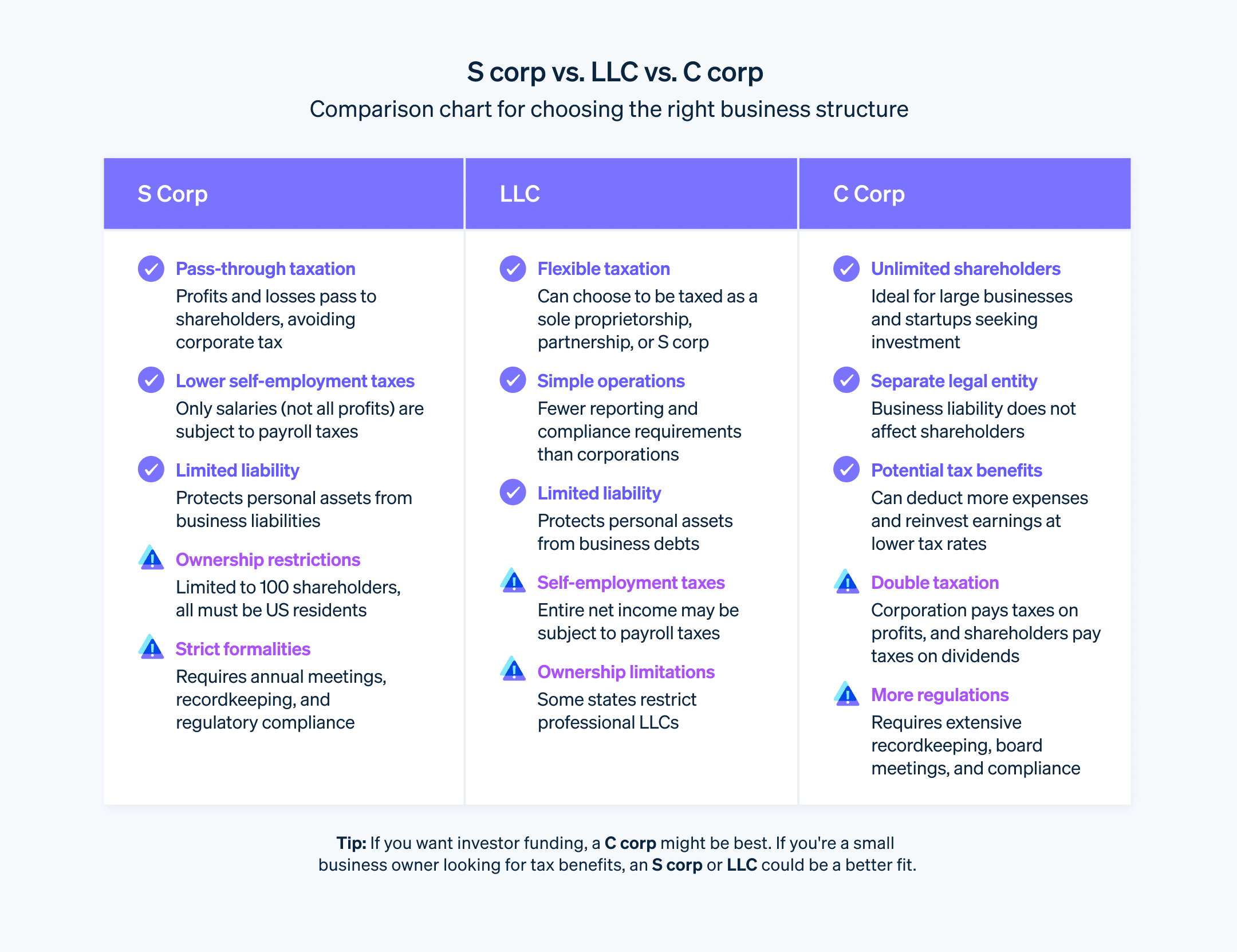S 公司,通常缩写为S corp,是美国公司的一种类型,专为中小型公司设计,具有一定的税收优势。当采用 S 公司结构时,可将公司收入、亏损、应税所得扣除额和抵免额转嫁给股东,而无需缴纳联邦公司所得税。这就是所谓的“直通式征税”,即公司无需为其利润缴税。相反,利润和亏损在股东的个人纳税申报表中进行申报,并按其个人所得税税率缴税。
在美国,您可在任何州注册成立 S 公司,但在一个州成立这种类型的实体与在另一个州成立该类型实体会有不同的影响。下面,我们将讨论哪些州更适合成立 S 公司,哪些州不太适合成立 S 公司,以及成立 S 公司所涉及的步骤。以下是您应该了解的内容。
本文内容
- S 公司的要求
- S 公司与其他公司结构的区别
- 美国最适合注册公司的州
- 对 S 公司不太有利的州
- 注册公司的步骤
S 公司的要求
S 公司是美国最常见的企业结构形式,占 2020 年企业纳税申报表的73%。要成为 S 公司,公司必须满足特定要求。
业务类型:某些业务类型,包括某些金融机构和保险公司,不能选择 S 公司状态。
地点:公司必须位于美国。
股东:公司的股东人数不得超过 100 人,且必须是美国公民或居民。股东可包括个人、某些信托和遗产,但不能包括合伙企业、公司或非居民外国人股东。
股票:_公司只能有一个等级的股票。虽然投票权可以不同,但分配权和清算权必须一致。
S 公司与其他公司结构的区别
虽然 S 公司与其他公司结构有许多相似之处,但 S 公司的征税、所有权和监管合规要求使其与众不同。以下是详细介绍:
S 公司与 C 公司
税务
S 公司: S 公司就税务而言是直通式税收实体。这意味着收入、亏损、扣除额和抵免额都流向股东,由股东在个人报税表中申报。S 公司不缴纳联邦所得税。
C 公司:C 公司须缴纳双重征税。公司要缴纳企业所得税,然后股东要为收到的股息缴税。
所有权限制
S 公司: S 公司对股东人数和类型有受限规定。其最多可有 100 名股东,且每个股东都必须是美国公民或居民。S 公司不能由 C 公司、其他 S 公司、有限责任公司 (LLC)、合伙企业或某些信托公司拥有。
C 公司: C 公司的股东人数不限,包括外国股东,并可拥有多个等级的股票。
公司成立和监管合规
S 公司和 C 公司通过填报公司章程成立。两者对公司手续(如举行年度会议和保存会议记录)的要求相似。
- S 公司: S 公司必须向美国国税局提交一份附加表格(表 2553),以选择 S 公司状态。
S 公司与有限责任公司
税务
S 公司: S 公司在股东一级实行直通式征税,但必须遵守美国国税局规定的要求和资格标准。
有限责任公司:有限责任公司也实行直通式征税,但比 S 公司更灵活。有限责任公司可以选择以独资企业、合伙企业、S 公司或 C 公司的形式纳税。
所有权和结构
S 公司: S 公司对股东人数和类型有受限规定,必须遵守公司结构标准,包括董事、高管和股东。
有限责任公司:与 S 公司相比,有限责任公司在所有权和管理方面更具灵活性。其对所有者(有限责任公司称为“成员”)的数量或类型无限制,可选择成员管理结构或经理管理结构。
监管合规和手续
S 公司:_ S 公司必须履行正式手续,如举行年度会议和保存会议记录。
有限责任公司:有限责任公司与 S 公司相比,监管合规要求较少,通常更容易维持,针对记录保存和会议的义务要求也不太严格。

美国最适合注册公司的州
虽然最适合注册公司的州取决于您的需求和具体情况,但美国某些州因其有利的公司成立条件而广受认可,吸引了来自全国乃至世界各地的企业。
特拉华州:特拉华州被称为美国的“公司之都”,是注册成立公司的热门选择,尤其是对于规模较大的公司和寻求风险资本的初创公司。该州因其税收优惠、有利于商业的法律、灵活的公司管理结构和衡平法院而受到青睐,衡平法院是专门处理商业纠纷的法院,以其在公司法方面的专业知识而闻名。
内华达州:内华达州是受欢迎的州之一,因其不征收州企业所得税、特许经营税和个人所得税。其还为公司高管和董事提供强有力的隐私保护,监管合规要求也相对简单。
怀俄明州:与内华达州一样,怀俄明州不征收州企业税、特许经营税或个人所得税,以其商业友好型环境而闻名。此外,怀俄明州还为所有企业提供强有力的资产保护福利和隐私保护。
南达科他州:南达科他州因其良好的税收环境而越来越受欢迎。其不征收企业所得税或个人所得税,监管环境相对简单。
得克萨斯州:得克萨斯州对企业具有吸引力,因其不征收个人所得税,劳动力众多且不断增长,经济势头强劲。但是,得克萨斯州征收一项基于企业收益的特许经营税。
佛罗里达州:佛罗里达州是注册公司的热门选择,因其不征收个人所得税,经济增长持续。其提供了一个相对有利于企业的监管环境,且市场巨大而多样化。
对 S 公司不太有利的州
某些州由于其税收政策、监管环境和整体企业氛围,被认为对 S 公司不太有利。虽然 S 公司受益于联邦税制中的直通式征税,但一些州的规则或税收结构会削弱这些益处或带来复杂性。
加利福尼亚州: 虽然加利福尼亚州是创新和创业的中心,但其征收最低年度特许经营税,并对S 公司净收入征收的 1.5% 的额外税。这些税收可能是一个沉重的负担,尤其是对规模较小的 S 公司而言。
纽约州: 纽约州,特别是纽约市,由于税制复杂、税率较高,对 S 公司来说可能是一大考验。纽约州就股东层面对 S 公司的收入征税,但纽约市不承认 S 公司,对公司本身征税。
伊利诺伊州: 伊利诺伊州对 S 公司的收入按股东的个人所得税税率征税,但对公司的收入还征收重置税。
新泽西州: 新泽西州的税收结构复杂,虽然 S 公司将收入转给股东,但该州有各种税收和费用,会影响 S 公司的整体税负。
明尼苏达州: 明尼苏达州对 S 公司征收州税,这可能会增加其总体税负。该州对 S 公司在企业层面(尽管税率低于 C 公司)和个人层面对企业的收入征税。
田纳西州: 田纳西州不承认联邦 S 公司的成立,州税收时将 S 公司视为普通公司。田纳西州不再要求年总销售额低于 100,000 美元的公司缴纳年度营业税,但销售额较高的 S 公司仍有缴纳营业税的义务。
注册公司的步骤
以下是注册公司所需步骤的概览:
选择正确的公司结构
有限责任公司:_通过直通式征税提供灵活性和更简单的操作。其为寻求较少形式化运作的小型企业的理想选择。
S 公司:_直通式征税,没有有限责任公司的自营职业税。对所有权有更严格的规定和限制。
C 公司:适合计划上市或寻求重大投资的企业。对所有权无限制,但有双重征税。
成立公司或有限责任公司
选择公司名称:您的公司名称应遵从该州的规定(例如,包括“有限公司”或“有限责任公司”),并能与该州现有的公司区分开来。向该州的公司实体登记处查询,以确保该名称可用。
选择注册州:考虑税务影响、法律环境和有利于企业的政策等因素。有些企业会选择在本州注册成立公司,而有些企业可能会选择特拉华州或内华达州等州,因为这些州有其公认的益处。
选择公司结构:根据最符合企业对责任保护、征税和所有权灵活性的需求,决定成立有限责任公司、S 公司还是 C 公司。
填报公司章程/组织章程:向所在州的公司报税办公室提交必要的文件。这通常包括公司名称、目的、主要地址、注册代理信息以及股份和股票的详细信息(如适用)等信息。
获得雇主识别号 (EIN):EIN 就像您公司的社会保障号。其是税收和开设公司银行账户所必需的信息。您可通过美国国税局申请 EIN。
创建公司章程或有限责任公司经营协议:这些文件概述了公司管理,包括董事和高级职员的职责、股东权利和会议协议。虽然并非所有州级报税都要求填报这些文件,但其为确定企业内部结构和运营的有用工具。
召开组织会议:对于公司而言,此举旨在通过公司章程、选举高级职员和执行其他组织任务。有限责任公司可利用这次会议批准经营协议并做出类似的基本决定。
登记州税和地方税收:根据您的工作地点和业务类型,您可能需要登记各种州税和地方税收,如销售税或失业保险税。
遵守执照和许可证要求:确保您拥有合法经营公司所需的所有执照和许可证。
评估各州法规和税务影响
了解公司法:_熟悉你所选择的公司注册州的公司章程。这些法律将规范公司的法律和运营框架。
分析税收要求:调查税务影响,包括收入税、特许经营税、销售税和财产税。请记住,州税法会影响您所选实体类型的利益,尤其是 S 公司。
Stripe Atlas 如何提供帮助
Stripe Atlas 可为贵公司搭建法律架构,助力在两个工作日内从全球任何地点完成融资、开设银行账户及接收付款。
已有超 7.5 万家公司通过 Atlas 完成注册,其中包括获 Y Combinator、a16z 与 General Catalyst 等顶级投资机构支持的初创公司。
申请使用 Atlas 注册公司
通过 Atlas 申请注册公司仅需不到 10 分钟。您可自主选择公司架构,即时核验公司名称是否可用,并可添加最多四位联合创始人。您还需确定股权分配方案,预留一定比例的股权供未来投资者与员工认购,指定公司管理人员,并通过电子签名完成所有文件签署。所有联合创始人也将收到邮件邀请,通过电子签名签署其对应文件。
在获取雇主识别号 (EIN) 前开通收款和银行服务
完成公司注册后,Atlas 会为您申请雇主识别号码 (EIN)。持有美国社会保障号、美国地址及手机号码的创始人可享受美国国税局 (IRS) 的加急处理服务,其他创始人则需通过标准流程申请,耗时可能稍长。此外,Atlas 支持在 EIN 下发前进行收款与银行开户操作,让您在 EIN 获批前即可开始收款并完成交易。
无现金创始人股权认购
创始人可使用知识产权(如版权或专利)而非现金认购初始股份,相关认购凭证将存储在 Atlas 管理平台中。使用该功能需满足知识产权估值不超过 100 美元的条件;若您持有的知识产权价值高于此限额,请在操作前咨询专业律师。
自动提交 83(b) 税务申报
创始人可通过提交 83(b) 税务申报降低个人所得税负。无论您是美国籍或非美国籍创始人,Atlas 均可代为完成申报流程——采用 USPS 认证邮件寄送并附带物流追踪服务。您可直接在 Stripe 管理平台获取已签收的 83(b) 申报表及官方寄送凭证。
全球顶尖水准的公司法律文件
Atlas 为您提供创办公司所需的全部法律文件。Atlas 的 C 类公司文件由全球顶尖风投律所美国科律律师事务所 Cooley 联合设计,旨在助您立即启动融资,并确保公司获得全方位法律保护,涵盖股权架构、权益分配及税务合规等核心领域。
Stripe Payments 服务首年免费,更享价值 5 万美元的合作伙伴专属优惠与折扣
Atlas 与顶级合作伙伴深度联动,为创始人提供独家优惠与资源支持,涵盖 AWS、Carta、Perplexity 等行业领军企业的工程开发、税务合规、财务管理及运营必备工具折扣,更免费赠送首年特拉华州法定注册代理服务。作为 Atlas 用户,您还将解锁 Stripe 专属权益——最高 10 万美元交易额的全年免费支付处理服务。
了解关于 Atlas 如何助您快速轻松地创立新企业的更多信息,或立即开始使用。
本文中的内容仅供一般信息和教育目的,不应被解释为法律或税务建议。Stripe 不保证或担保文章中信息的准确性、完整性、充分性或时效性。您应该寻求在您的司法管辖区获得执业许可的合格律师或会计师的建议,以就您的特定情况提供建议。